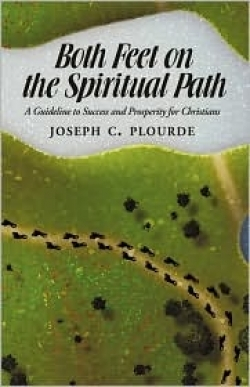Both Feet on the Spiritual Path
A Guideline to Success and Prosperity for Christians
Manitoba native Joseph C. Plourde has been a Christian since the early 1980s. In this hands-on workbook, he offers advice and teachings on attaining true faith, utilizing God-given intelligence, and even employing the gift of common sense.
Less a religious guide and more of a spiritual workbook, Both Feet on the Spiritual Path focuses on what it took for the author to become the faithful Christian that he is today. Plourde divides the book into chapters dedicated to subjects such as forgiveness, wisdom, intelligence, learning, love, and “D.T.C.”—his acronym for “discipline, thought, and control.” One compelling aspect of this work is that Plourde never tries to convert readers to his faith, but simply attempts to show them the process by which he came to be who he is today—mentally, physically, and spiritually.
Early in the text, Plourde presents the notion of understanding the reality of life and coming to terms with that reality. He claims that, “if we can focus on the truth about reality of life, and understand what it really is, then we start to see what the real problems are and where they came from.” His thoughts on this subject are fascinating, and his ability to clearly relate them as a teaching not of God but of the universe as a whole dominate the book. Plourde never speaks directly to Christians or those most familiar with the Bible, but rather to the everyday reader. It is this aspect of Plourde’s work that makes it a compelling read and a powerful tool for a successful life.
The book’s main downfall—the quiz he asks readers to take at the conclusion of the text—is probably the tool that Plourde finds most useful. After concluding his lessons, Plourde seems to lose confidence in the effectiveness of his teachings and asks readers to name different commandments and fill in the blanks for selected quotations from the text. Some readers may see this quiz as a last ditch effort to draw people into Christianity. Whatever one’s conclusions, the exercises do nothing to affirm readers’ understanding of the book’s teachings.
Disclosure: This article is not an endorsement, but a review. The publisher of this book provided free copies of the book and paid a small fee to have their book reviewed by a professional reviewer. Foreword Reviews and Clarion Reviews make no guarantee that the publisher will receive a positive review. Foreword Magazine, Inc. is disclosing this in accordance with the Federal Trade Commission’s 16 CFR, Part 255.

